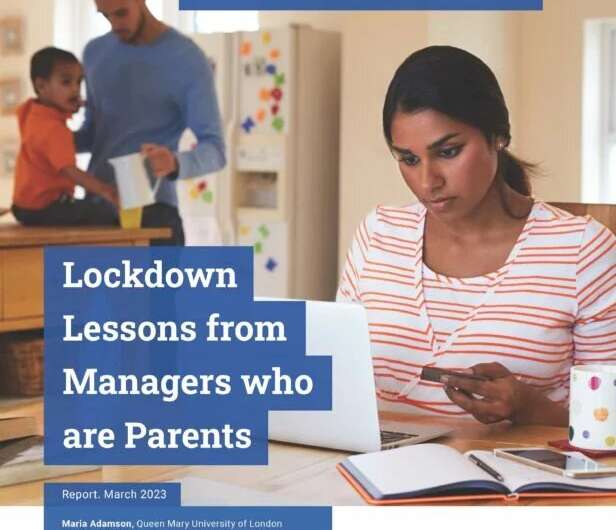Future-proofing flexible working: Learning lessons from lockdown to help working parents

Dr. Maria Adamson, co-director of Queen Mary’s Center for Research in Equality & Diversity and senior lecturer in the School of Business & Management, has written for advocacy charity Working Families about how COVID lockdowns could make workplaces more welcoming to parents and caregivers.
“The COVID-19 pandemic created a unique social experiment in the world of work,” says Dr. Adamson. “Where previous global crises such as wars or recessions have pushed women out into the labor market, this one pushed everyone and everything into the home.”
Dr. Adamson began leading the research project “Parents, managers and flexible work” during the pandemic, working with fellow University of London experts Professor Alexandra Beauregard (Birkbeck) and Professor Suzan Lewis (Middlesex). Dr. Adamson explains: “Between us we have been working for decades on gender in the workplace, then along came the ultimate home-working experiment. As homeworking became widespread almost overnight, despite significant challenges for parents it was clear that what was emerging from the crisis was relevant for equality.”
Together, the three researchers planned an in-depth study of how COVID restrictions affected parents who were working in management roles in a wide variety of sectors. They conducted interviews with 42 parents in spring 2021, shortly after the third and final U.K. lockdown. A year later, they carried out 23 follow-up interviews. Combined, these interviews provide a uniquely rich account of how parents managed through the crisis.
“There’s been quite a few snapshot surveys looking at how workers were coping with the lockdowns,” Dr. Adamson continues. “But we wanted to find out in detail about the highs and lows for working parents and caregivers, and what we can learn to make things better in the future. All the people we spoke to were also managers, meaning they had influence over other people’s workload, flexibility and work-life balance.
“We found that flexible working was embraced, even in unexpected sectors like construction,” Dr. Adamson explains. “But this flexibility did not alleviate the intense workload that parents had. Many we spoke to stressed that the freedom to work flexibly typically means freedom to work all the time. We must recognize that many parents, especially mothers, are feeling burnt out; some told us they changed their jobs because flexibility was lacking.”
Focusing on lessons to learn from the pandemic, Dr. Adamson says, “The key thing that worked in this crisis, which can be applied to any high-pressure work situation, is an effective management of workload. You can’t just squeeze five days of work into three days. The ability to strategically prioritize and manage workload in a sustainable way allows people to retain productivity and well-being. There’s a need to train managers to prioritize and drop anything that’s not important, and to role model this approach for others.”
The report includes recommendations for companies that more jobs could be assessed according to what is produced, rather than the hours worked; for example, someone working in customer service could handle the same number of complaints regardless of their pattern of work across a week. However, when moving to flexible or hybrid work, review processes need to be established to ensure that workload is manageable. This must be an ongoing process as workers and line managers tend to accrue more roles and their workloads become unmanageable.
The study also revealed some surprising differences between mothers and fathers. Exploring flexible working as a gendered experience, Dr. Adamson says, “Mums working from home during the lockdown were exhausted and stressed as they took on a large share of additional care and household responsibilities.
“Dads had a more positive experience. For many of them it was an unusual experience, and they enjoyed spending more time with their children. In the second round of interviews, dads said almost unanimously that not being able to work flexibly would be a deal breaker in employment. We should not dismiss this finding, it’s a positive that we can build on.
“Research shows that women do better in their careers if their partners work flexibly. So, we want employers to offer and encourage flexible working arrangements for fathers. Ultimately, we want flexible working to be more equitable for both mums and dads—at home, and in the workplace.”
The report offers a range of practical recommendations for parents, managers and organizations seeking to foster more flexible and inclusive working cultures. Dr. Adamson concludes: “Lockdowns were tough, but we’ve learned something good from the pandemic. I hope we can build on what we’ve learned about flexible working to improve gender equality and bring benefits to both employers and employees.”
More information:
Future-Proofing Your Flexible Workforce: Lockdown Lessons From Managers Who Are Parents. workingfamilies.org.uk/publica … -flexible-workforce/
Citation:
Future-proofing flexible working: Learning lessons from lockdown to help working parents (2023, April 13)
retrieved 14 April 2023
from https://phys.org/news/2023-04-future-proofing-flexible-lessons-lockdown-parents.html
This document is subject to copyright. Apart from any fair dealing for the purpose of private study or research, no
part may be reproduced without the written permission. The content is provided for information purposes only.
For all the latest Science News Click Here
For the latest news and updates, follow us on Google News.

